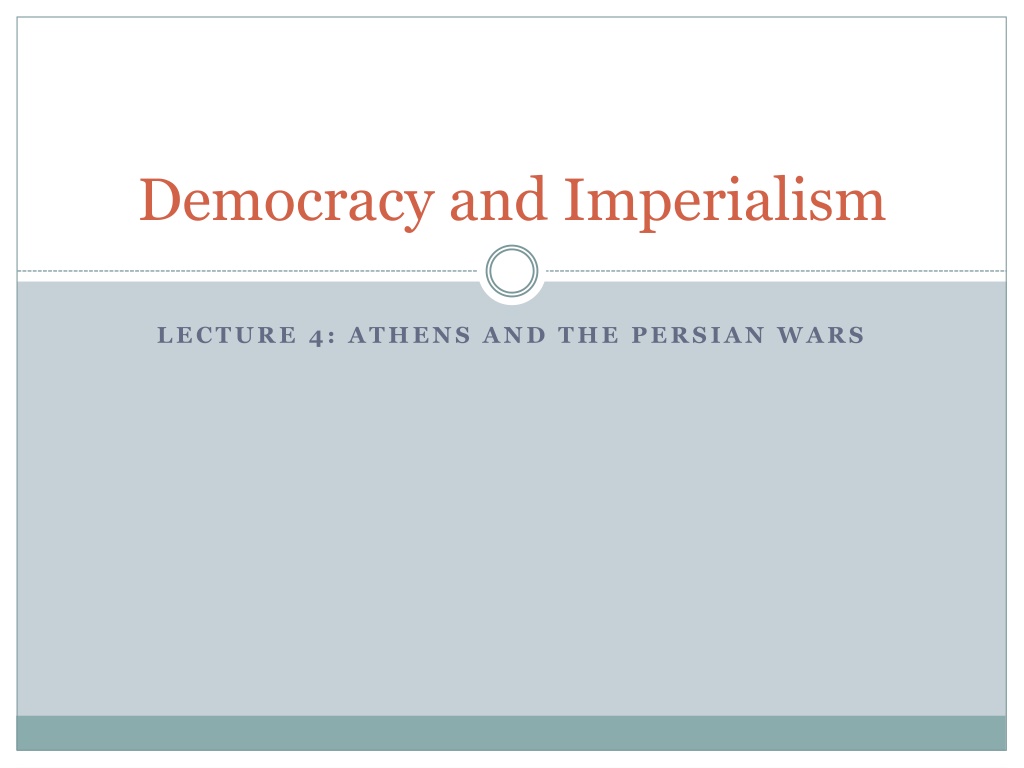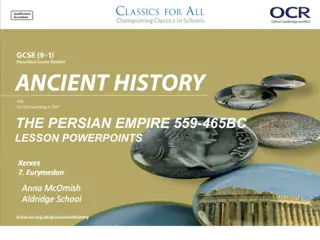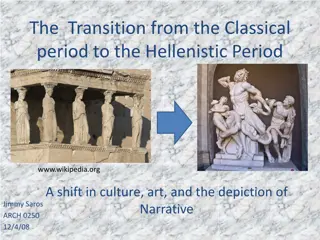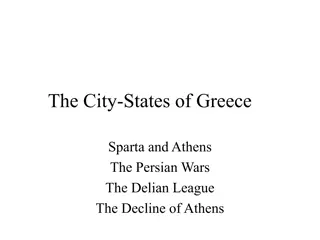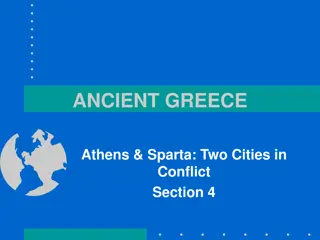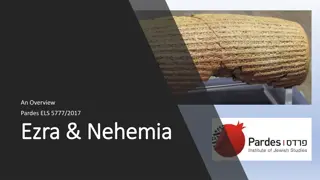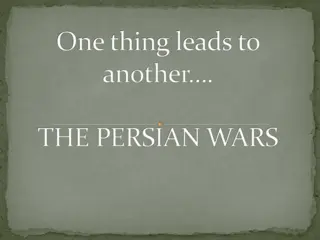The Impact of Athens and the Persian Wars on Democracy and Imperialism
The lecture delves into the historical events surrounding Athens and the Persian Wars, highlighting key milestones such as the expulsion of Hippias with Spartan help, Cleisthenes' reforms, and the rise of Archaic Greek imperialism in Athens and Sparta. Herodotus' perspective on the Persian Wars and the arrival of the Persians further enrich the narrative, depicting the Ionian Revolt and the consequential battles that shaped the democratic and imperialistic landscape of ancient Greece.
Download Presentation

Please find below an Image/Link to download the presentation.
The content on the website is provided AS IS for your information and personal use only. It may not be sold, licensed, or shared on other websites without obtaining consent from the author. Download presentation by click this link. If you encounter any issues during the download, it is possible that the publisher has removed the file from their server.
E N D
Presentation Transcript
Democracy and Imperialism LECTURE 4: ATHENS AND THE PERSIAN WARS
Athens in 507/6 Hippias driven out with Spartan help (510) Spartan-backed coup by Isagoras thwarted (508) Cleisthenes reforms enacted: tribes, demes, Council, generals, ostracism Successful defence of new order against Spartan- Boeotian-Chalkidian alliance
Archaic Greek imperialism: Athens Solon encourages Athens to take back Salamis (c. 600). Cleruchs established in late 6th century Peisistratus wins fame in war against Megara (560s) Miltiades the Elder seizes and fortifies Thracian Chersonese (520s?) Peisistratids seize Naxos and install friendly tyrant 4000 cleruchs established on Euboea after victory against Chalcis (506) Ongoing war with Aegina for naval hegemony
Herodotus and the Persian Wars Herodotus of Halicarnassus (c. 484-425) Born in the Persian Empire, lived in Athens Set out to describe great and marvellous deeds of Greeks and barbarians , and especially the causes of the wars between them Obsessed with the rise and fall of great powers Describes events down to 479/8, but occasionally flashes forward to his present day
The arrival of the Persians Croesus of Lydia conquers Greek cities in Asia Minor (early 6th century) This Croesus was the first foreigner whom we know who subjugated Greeks and took tribute from them. ( ) Before the reign of Croesus, all Greeks were free. (Hdt. 1.6.2-3) Croesus provokes Persia; Cyrus the Great conquers Lydia (546) Spartans send envoy to tell Cyrus that he was to harm no city on Greek territory, or else the Lacedaemonians would punish him. (Hdt. 1.152.3) Persians expand under Darius the Great (521-486): Thrace, Macedon
The Ionian Revolt (499-494) Ionians oust their Persian-backed tyrants Athens and Eretria support the revolt The Athenians, now persuaded, voted to send twenty ships to aid the Ionians. ( ) These ships were the beginning of evils for both Greeks and barbarians. (Hdt. 5.97.3) Persian campaigns on land crush the revolt; decisive naval battle at Lade (494)
A cruel Persian yoke? [Artaphrenes] measured their lands by parasangs, which is the Persian name for a distance of thirty stadia, and ordered that each people should according to this measurement pay a tribute which has remained fixed as assessed by Artaphrenes ever since that time up to this day; the sum appointed was about the same as that which they had rendered before. Herodotus 6.42.2 Mardonius deposed all the Ionian tyrants and set up democracies in their cities. Herodotus 6.43.3
Resumed Persian expansion 492/1: Thasos, Thracian coast, Macedon (campaign ends in disaster) 490: Naxos, Cyclades, Euboea (campaign ends at Marathon) 486/5: death of Darius the Great 480: Xerxes invades mainland Greece
Persian imperialism: source questions What source is this? Who created it, and why? How does it justify Persian imperialism? How does the Greek view differ from the Persian?
Why does Athens fight? We know the Athenian temper to be such that there is nowhere on earth such store of gold or such territory of surpassing beauty and excellence that the gift of it should persuade us to take the Persian side and enslave Greece. For there are many great reasons why we should not do this, even if we so desired; first and foremost, the burning and destruction of the adornments and temples of our gods, whom we are constrained to avenge to the utmost rather than make pacts with the perpetrator of these things, and next the kinship of all Greeks in blood and speech, and the shrines of gods and the sacrifices that we have in common, and the likeness of our way of life, to all of which it would not befit the Athenians to be false. Know this now, if you knew it not before, that as long as one Athenian is left alive we will make no agreement with Xerxes. Herodotus 8.144.1-3
Athenian democracy and the Persian Wars 507/6: envoys of democracy, desperate for allies, submit to Persia; on their return they were greatly blamed for what they had done (Hdt. 5.73.3) 499: Aristagoras of Miletus persuades the Assembly to support Ionian Revolt; it seems, then, that it is easier to deceive many than one, for he could not deceive Cleomenes of Sparta, one single man, but thirty thousand Athenians he could (Hdt. 5.97.2) 491: Darius demands formal submission; Athenians throw his emissaries into the Pit 490: Persians land at Marathon, intending to restore Hippias as tyrant
The early democracy at Marathon Army led by board of 10 generals + Callimachos the polemarch (War Archon) Rotating supreme command Decision to fight made by vote Role of Miltiades powers of persuasion
The early democracy against Xerxes 483: new man Themistocles persuades the Assembly to use silver from Laurium to expand the fleet 480: Debate over meaning of oracle about Athens fate; Themistocles persuades the Assembly to evacuate Attica and put their faith in the fleet Athenians accept Spartan supreme command even at sea, seeing that if they quarrelled over the leadership, Greece must perish (Hdt. 8.3.1) Athens razed to the ground, but Athenians persist
The Decree of Themistocles Resolved by the Council and the People. Themistocles son of Neocles of the deme Phrearrhioi made the motion. The city shall be entrusted to Athena, Athens protectress, and to the other gods, all of them, for protection and defence against the barbarian on behalf of the country. The Athenians in their entirety and the foreigners who live in Athens shall place their women and children in Troezen. ( ) The rest of the Athenians in their entirety and those aliens who have reached young manhood shall embark on the readied two hundred ships and they shall repulse the barbarian for the sake of liberty, both their own and that of the other Greeks, in common with the Lacedaemonians, Corinthians, Aeginetans and the others who wish to have a share in the danger.
Who defeated the Persians? So great will be the mass of clotted gore spilled by the Dorian spear upon Plataean soil that heaps of dead will reveal, even to the third generation, a voiceless record for the eyes of men that mortal man should not vaunt himself excessively. For hubris, when it has matured, bears as its fruit a crop of disaster, from which it reaps an abundant harvest of tears. Aeschylus, Persians 816-822 Is this not a scandal? What! the water-clock is to kill the white-haired veteran, who, in fierce fighting, has so often covered himself with glorious sweat, whose valour at Marathon saved the country! Aristophanes, Acharnians 692-698 Our city was so far superior while she stood unharmed that even after she had been laid waste she contributed more ships to the battle for the deliverance of Greece than all the others put together who fought in the engagement; and no one is so prejudiced against us that he would not acknowledge that it was by winning the sea fight that we won the war, and that the credit for this is due to Athens. Isocrates, Panegyricus 98
Key themes in Herodotus Freedom of the Greeks rhetoric of liberty and equality Warning against imperialism powered by greed Warning against hubris/imperious overreach A lesson learned
